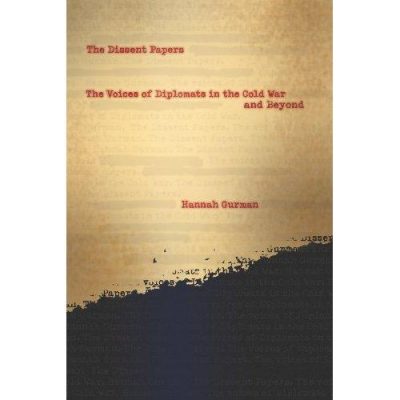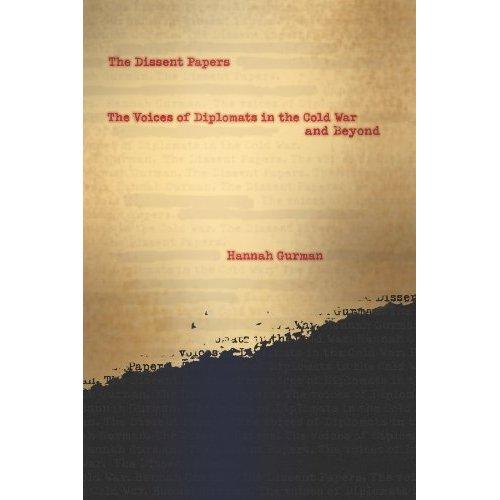 A love letter to the process of writing, Hannah Gurman’s exhaustively researched book The Dissent Papers focuses on what Gurman calls “the writerly diplomat,” highlighting how diplomatic dissenters present themselves politically in their attempts to move foreign policy away from the status quo. Gurman asserts that the diplomatic dissenter’s greatest weapon is the pen and draws on four separate case studies: George Kennan’s role in shaping U.S. perceptions of the USSR, “China hands” Jack Service and John Davies’ attempts to dissuade the United States from supporting Chiang Kai-sheck, George Ball’s dissent during the Vietnam War, and Brady Kiesling and Joseph Wilson’s criticism of the U.S. war efforts in Iraq and Afghanistan. Gurman explores how dissenters express themselves, whom they target as an audience, and how they often formulate their ideas and authorial voice as a byproduct of the process of writing.
A love letter to the process of writing, Hannah Gurman’s exhaustively researched book The Dissent Papers focuses on what Gurman calls “the writerly diplomat,” highlighting how diplomatic dissenters present themselves politically in their attempts to move foreign policy away from the status quo. Gurman asserts that the diplomatic dissenter’s greatest weapon is the pen and draws on four separate case studies: George Kennan’s role in shaping U.S. perceptions of the USSR, “China hands” Jack Service and John Davies’ attempts to dissuade the United States from supporting Chiang Kai-sheck, George Ball’s dissent during the Vietnam War, and Brady Kiesling and Joseph Wilson’s criticism of the U.S. war efforts in Iraq and Afghanistan. Gurman explores how dissenters express themselves, whom they target as an audience, and how they often formulate their ideas and authorial voice as a byproduct of the process of writing.
Gurman begins her exploration with an introduction to one of America’s most influential diplomats, George Kennan. Known for his formative role in shaping U.S. relations with the Soviet Union, Kennan began as an intellectual outsider to the diplomatic establishment. His famous “Long Telegram” argued that U.S. foreign policy was overlooking complex layers of Russian history, culture, and politics in favor of a narrow focus on the threats posed by Marxist-Leninist ideology. Kennan succeeded as a diplomatic dissenter in part by mixing his dissent with what his superiors wanted to hear and by writing ambiguously enough to allow for a limited amount of interpretation. Most intriguing of all, Gurman profiles how Kennan made important shifts and adjustments in his reporting to ensure that his recommendations would be well received by policymakers. These shifts reflect not only how Kennan was molding the foreign policy establishment, but also how it was affecting him. In short, Gurman captures Kennan’s journey from political outsider to courtesan author.
Gurman categorizes diplomatic dissenters according to different styles they adopt in their diplomatic writing, most importantly whom they choose as their audience. Kennan followed the practice Gurman referred to as “inside writing.” Inside writing is tailored to senior officers, intellectuals, and others within the foreign policy establishment. Another adherent to this mode of writing was John Davies. Davies often sent copies of his reports to his confidante Lauchlin Curie. Curie was an assistant to President Franklin Roosevelt and would occasionally pass bits of Davies’ reports on to the president. This, the author points out, is the true power of insider writing — tailoring an argument to those with the power to affect policy. Gurman also classified George Ball as a practitioner of inside writing, not only due to his prose but also his refusal to engage in public dissent against the war in Vietnam. Ball earned the president’s trust by publicly supporting the president’s Vietnam policy despite his personal reservations. In Ball’s opinion, diplomatic dissent was not a matter of public concern.
Inside writing became increasingly ineffective after the Nixon administration created the Dissent Channel, which hid diplomatic dissent from the public and the foreign policy establishment. Instead, dissenting reports went straight to the secretary of state. According to Gurman’s account, the Dissent Channel was a bureaucratic rug under which diplomatic dissent reports could be swept.
This predicament led to the proliferation of what Gurman aptly calls “outside writing” in the 21st century, as diplomats protested wars in Iraq and Afghanistan under the second Bush administration. Outside writing appeals to the general public instead of political insiders. In 2003 Brady Kiesling, the U.S. political counselor at the Greek embassy, resigned his post publicly by writing an open letter that was sent both through the Dissent Channel and to The New York Times. In this letter, Kiesling expressed his disappointment at the Bush administration’s handling of the war in Iraq and his own personal disillusionment at his ability to serve and give back to his country. By writing directly to the American people, Kiesling found a way to break through the Dissent Channel and influence public opinion.
Kiesling was not the first to engage in this practice of going straight to the public. Jack Service, in contrast to his peer John Davies, published many of his reports in the journal Amerasia. Service felt that Americans deserved to know about the mistakes Washington was making in supporting the corrupt anticommunist leader Chiang Kai-sheck in China. Ultimately, his outspoken opposition to America’s ally and close contacts with the Chinese Communist Party hurt Service’s credibility during the Red Scare.
George Kennan, the patron saint of dissenting diplomats, remained adamant throughout his long career that international affairs were unpredictable and policymakers should not rely on diplomats as soothsayers. Despite Kennan’s warning, Gurman demonstrates how these diplomats were in many respects like prophets. They succeeded in forecasting otherwise unanticipated consequences of the status quo that went against the grain of the ruling elite, often being forced into exile as a result only to be acknowledged later once their predictions proved true. With Kennan as the exception to the rule, Service, Davies, and Ball were eventually relegated to a life of exile from the political and foreign policy establishment, not to be recognized for the accuracy of their insights until long after the policies they were criticizing had run their course.
The greatest debate that arises from this book is not a matter of inside-versus-outside writing but the battle over defining good politics. Kennan and Ball might claim the high ground by pointing out that they were able to represent dissenting opinions for longer than Service, Davies, Kiesling, or Wilson. Their success came from knowing when to withhold or dilute their dissent. Their detractors would argue that such politicians are useless as agents of dissent if they are unwilling to be outspoken in their criticism. The problem with becoming a dissenter to the court is that you open yourself up to accusations of “selling out.”
Mark Twain once said that “history does not repeat itself, but it does rhyme.” Gurman exposes these rhymes throughout generations of dissenting diplomats. Such rhymes include Johnson’s fear of being accused of “losing Vietnam” the same way Truman was accused of losing China, as well as the political savvy demonstrated by Ball and Kennan to effectively relay diplomatic dissent without alienating themselves from their superiors. The Dissent Papers is a fascinating exposé of the role that strategic writing has in formulating comprehensive diplomatic dissent and its ability to shape the future of U.S. foreign policy.
